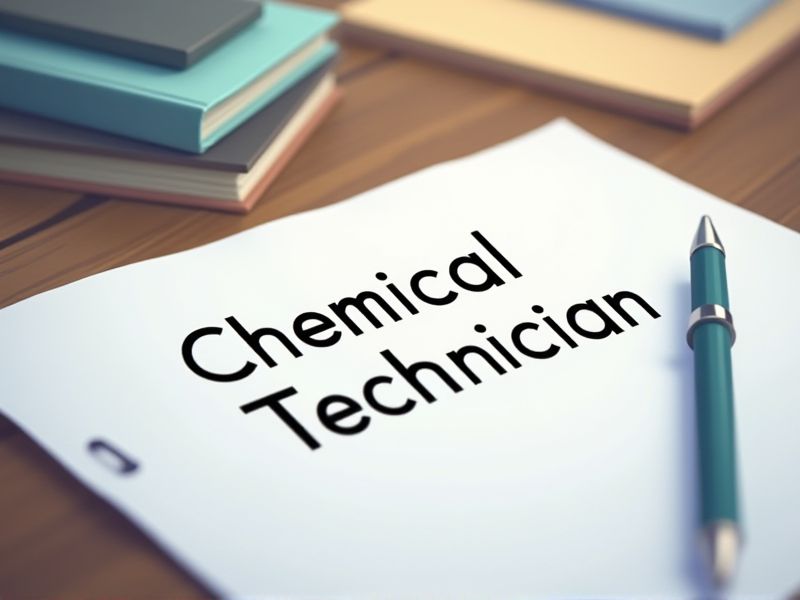
Chemical Technicians work with hazardous materials, which necessitates knowledge of safety protocols. Certifications validate their understanding of chemical handling procedures, ensuring workplace safety and compliance with regulations. They also demonstrate a technician's proficiency in laboratory techniques, increasing their job efficiency and reliability. Here are some important certifications you may need as a Chemical Technician.
OSHA 10-Hour General Industry Certification
The OSHA 10-Hour General Industry Certification provides chemical technicians with a robust understanding of workplace safety regulations, reducing the likelihood of accidents. By equipping technicians with knowledge on hazard recognition, it directly impacts their ability to manage and mitigate risks associated with chemical handling. Legal compliance requirements in many industries mandate such certifications, ensuring organizations meet federal safety standards. Enhanced safety awareness can lead to a reduction in workplace incidents, ultimately improving productivity and morale among staff.
OSHA HAZWOPER Certification
Chemical technicians often handle hazardous substances, increasing their risk of exposure to harmful materials. OSHA HAZWOPER certification provides essential training on safe practices and emergency response, reducing potential accidents. Employers can meet regulatory compliance by ensuring their technicians hold this certification, thus avoiding legal liabilities. The certification process also empowers technicians with the knowledge to protect themselves and their coworkers, fostering a safer workplace environment.
Hazard Communication (HAZCOM) Certification
Chemical technicians frequently handle hazardous substances, and HAZCOM Certification ensures they understand labeling and safety data sheets, reducing accidents. Miscommunication regarding chemical hazards can result in serious injuries or regulatory non-compliance. The certification aligns technicians with OSHA standards, facilitating safer work environments and reducing liability. Knowledge from HAZCOM empowers technicians to implement emergency procedures effectively, mitigating potential chemical spill impacts.
Laboratory Safety Certification
Laboratory Safety Certification enhances a chemical technician's ability to handle hazardous substances responsibly, reducing the risk of accidents. It ensures compliance with regulatory standards, minimizing legal liabilities for the workplace. Proper certification fosters a culture of safety, which is critical in environments where errors can have serious consequences. Comprehensive safety training also leads to increased operational efficiency, as certified technicians are better equipped to manage emergency situations.
Chemical Hygiene Plan Training Certification
Chemical Hygiene Plan Training Certification ensures chemical technicians understand safe handling and usage protocols, reducing workplace accidents and exposure risks. Certification allows technicians to comply with legal and regulatory standards, avoiding potential fines and legal issues for the organization. Knowledge from the training helps in proper disposal of hazardous materials, minimizing environmental impact and promoting sustainability. Certified technicians convey competence, building trust with colleagues and fostering a culture of safety within the laboratory.
Process Safety Management (PSM) Certification
Chemical technicians work with hazardous substances, which increases the potential for accidents if mishandled. PSM certification provides them with the necessary knowledge to understand and control these risks effectively. Comprehensive training in PSM equips technicians with expertise in safety protocols, thereby reducing incident rates in chemical facilities. Data shows that facilities with PSM-trained personnel have fewer workplace accidents and improved compliance with safety regulations.
Certificate in Good Laboratory Practices (GLP)
Compliance with Good Laboratory Practices (GLP) ensures that chemical technicians produce reliable and consistent data, which is crucial for regulatory submissions. GLP certification signifies that technicians understand and can implement standardized procedures, enhancing the credibility and validity of laboratory results. This certification also helps in minimizing laboratory errors and improving safety protocols, protecting both technicians and the environment. Many industries require GLP adherence to maintain quality standards, making certification a valuable credential for career advancement.
Six Sigma Yellow Belt Certification
A Six Sigma Yellow Belt Certification provides a chemical technician with foundational knowledge of process improvement methodologies, which enhances their ability to optimize laboratory operations. With this certification, a technician gains skills in identifying inefficiencies and reducing waste, leading to more cost-effective and reliable chemical analysis. Understanding Six Sigma principles equips technicians to actively contribute to quality control initiatives, improving product consistency and safety. The certification also prepares chemical technicians for collaboration on cross-functional teams, facilitating better communication and problem-solving in complex industrial environments.
First Aid/CPR Certification
Chemical technicians work with potentially hazardous materials and environments, increasing the likelihood of accidents. First Aid/CPR certification equips them with crucial skills to respond effectively to emergencies, minimizing injury severity. In chemical facilities, quick response to incidents can significantly reduce downtime and prevent escalation. Companies often require this certification to ensure safety compliance and enhance workplace safety culture.
Environmental Safety and Compliance Certification
Chemical technicians work with hazardous materials, so Environmental Safety and Compliance Certification ensures they understand proper handling procedures, reducing the risk of accidents. Regulatory bodies often mandate these certifications to align practices with environmental laws, minimizing legal liabilities for companies. Certification enhances technicians' knowledge of eco-friendly waste management, promoting sustainability. It signals competency to employers, increasing job opportunities and career advancement for technicians.
Summary
You'll notice an enhancement in a Chemical Technician's competency when they obtain certifications, as these often signal specialized knowledge and skills. This usually leads to improved job performance and efficiency in handling complex processes. With certifications, you might also see increased opportunities for career advancement and potentially higher salaries. Employers tend to value certified technicians due to their demonstrated commitment to professional development and expertise.
